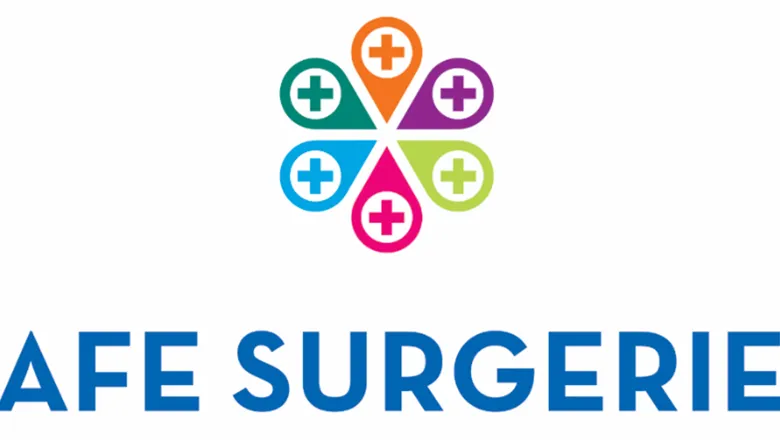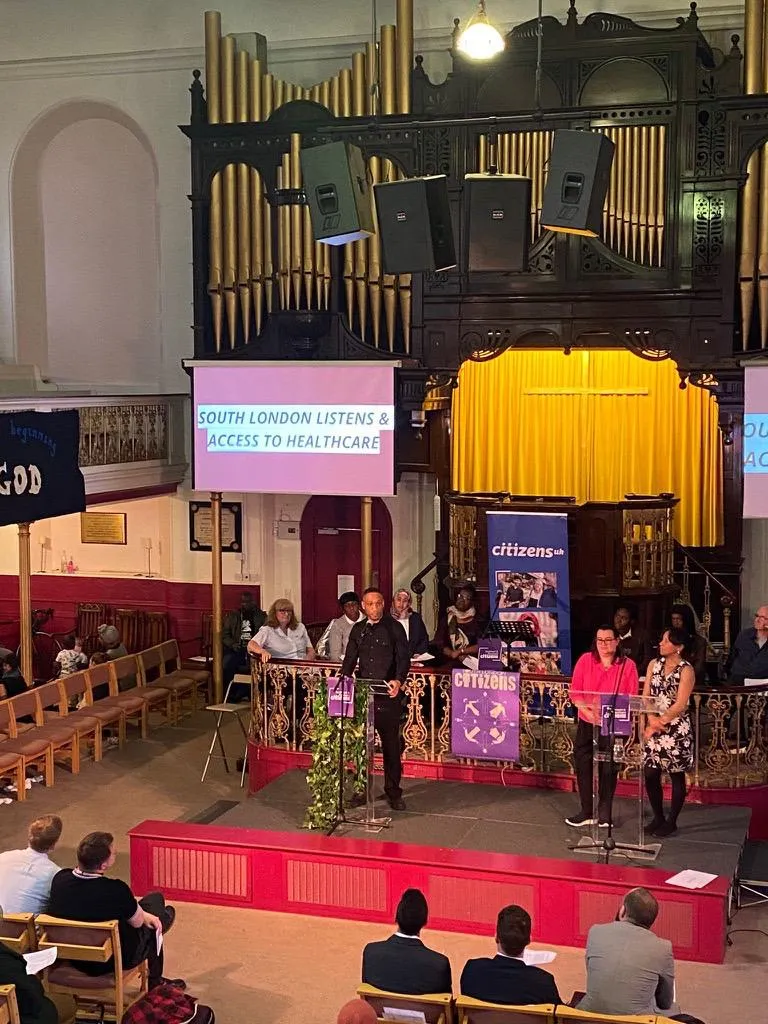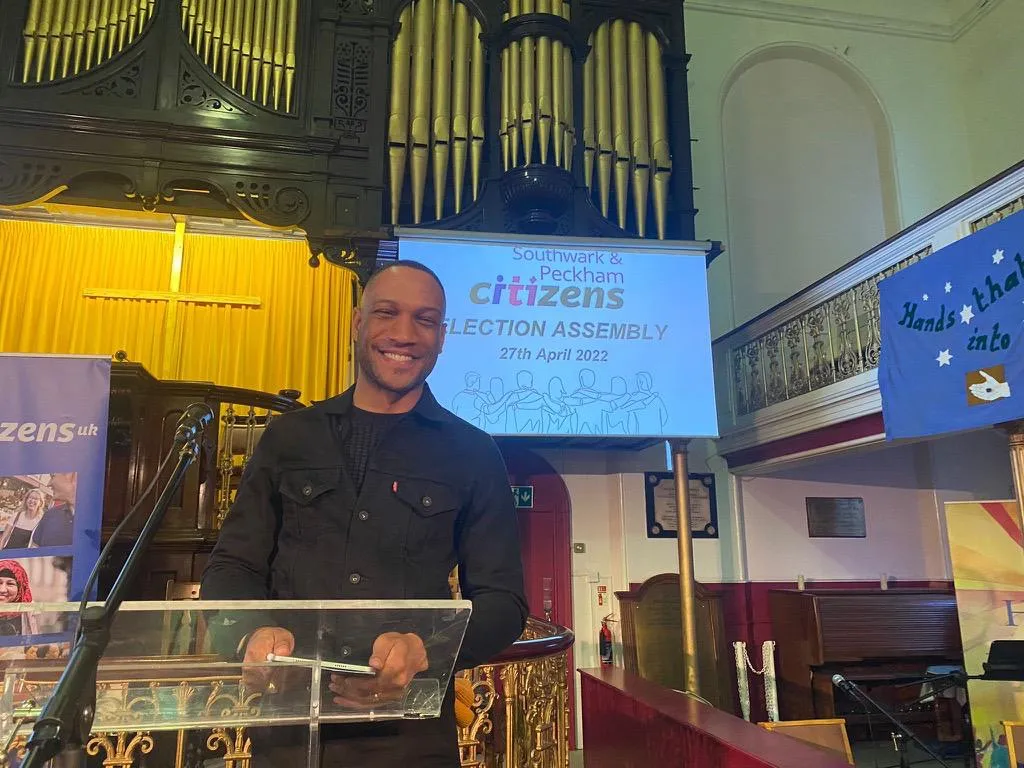Throughout our time in Croydon, it was the members of the community that shared their personal stories and experiences, and in doing so, bit by bit, revealed to us the actions and the direction we needed to take along the way.
Jasmine Kato-Naughton, MA student and member of the Croydon campaign group
07 February 2023
War Studies students support Safer Surgeries Network in South London
MA students have promoted a network that removes barriers faced by migrants when accessing healthcare.

A group of MA students from King’s Department of War Studies has supported the Doctors of the World Safer Surgeries Network (SSN) by campaigning across South London’s boroughs. As part of King’s Service-learning MA module, which is co-delivered by Citizens UK, the students have worked collectively on a campaign to ensure migrants have access to healthcare services.
The ‘Migration, Social Justice and Community Organising’ module at King’s combines class-based learning with societal impact, allowing students to develop and run community organising campaigns. The SSN initiative that the students’ campaign is centred around is also backed by South London Listens, a campaign organised by Citizens UK chapters in South London that aims to limit the longer-term impacts of the Covid-19 pandemic on mental health and wellbeing.
About the Safer Surgeries Network campaign
Migrants can face several obstacles when attempting to access healthcare services, from language barriers to a lack of documentation and proof of address when registering for GP surgeries. These practices can in turn create hostile environments for migrants, making them uncomfortable to or have difficulty in accessing GP services. The ‘Migration, Social Justice and Community Organising’ students focused on tackling these issues by supporting the wider SSN initiative.
SSN’s main aim is to remove barriers migrants face when accessing healthcare by equipping GPs with training and best practices to create a welcoming environment for migrants. Practices that declare themselves a ‘Safe Surgery’ for everyone ensure that lack of ID or proof of address, immigration status or language are not barriers to patient registration. Through campaigning in different groups across South London boroughs, including Southwark, Lewisham and Croydon, the MA students encouraged GPs to either sign up for the SSN or ensure GPs were following relevant guidelines if they had already committed to the network. By directly engaging with GPs in their borough, the Croydon campaign group saw the number of Safer Surgery GPs increase by 25%.
Through community organising, the students built relationships with stakeholders, such as local migrant networks, Citizens UK chapters and community groups. By running listening campaigns with these stakeholders, the students identified issues that specifically impacted their assigned boroughs and learnt about the migrants’ lived experience as healthcare service users.
Jasmine Kato-Naughton, a member of the Croydon campaign group said: ‘Throughout our time in Croydon, it was the members of the community that shared their personal stories and experiences, and in doing so, bit by bit, revealed to us the actions and the direction we needed to take along the way.
The most challenging, emotional conversations were also the most powerful and important for our campaign. At times it could be difficult to stay focused on the issue at hand. Despite this, with each meeting and conversation, I always found myself coming away with a fresh perspective and a renewed resolve.’
When attending Citizens UK’s accountability assemblies for their boroughs, King’s students presented insights from their campaigns and were able to voice the lived experiences of the migrants and community groups they had met. A major win for the Croydon campaign group came from presenting at their local Mayoral Assembly as the Mayor of Croydon responded to their proposal and agreed to host a GP-community summit to improve mental health services in Croydon.
King’s MA student, Akeem Ali, shared the Southwark campaign group’s findings at an accountability assembly in April 2022 and called on the next leader of Southwark council to write to every GP surgery in the borough to ask them to become a Safe Surgery and equip their staff to improve migrants’ access to healthcare.

It was a privilege to speak on behalf of my group at the Southwark & Peckham Accountability Assembly and present the results of our surgery calls as well as clear asks of the Southwark Council candidates. While it was a challenge to summarise our campaign in less than 2 minutes, our efforts paid off as both candidates agreed to take up our challenge to increase migrant access to healthcare should they be elected.
Akeem Omar Ali, National Security MA student and member of the Southwark campaign group

The campaigns led by the King’s students continue to have a significant impact. In October 2022, South London’s new Integrated Care Systems agreed to endorse the Safer Surgeries campaign which requires all South London GPs to actively embed Safer Surgeries guidance. There was also a personal impact for one of the student campaigners who secured a full-time role as a Citizens UK community organiser and is continuing the work they started when completing the module.
I now work as a Lewisham-based community organiser with Citizens UK, and I am currently building upon my work from the ‘Migration, Social Justice and Community Organising’ module by leading on Safer Surgeries campaigning with South London Citizens. In my job, I have directly applied the research I completed and used the relationships I formed during the module.
Erica Scott, a member of the Lewisham Campaign Group
The ‘Migration, Social Justice and Community Organising’ Module
The ‘Migration, Social Justice and Community Organising’ module forms part of the King's Sanctuary Programme’s commitment to develop practical and innovative responses by drawing on, and developing, the combined skills and experiences of King’s staff and students.
King’s students who were part of the SSN campaign enrolled in the module to learn about the concept of community organising and migration, and to engage with local activism in London.
As the daughter of a migrant, as well as having grown up around many other first and second-generation migrants, I wanted to learn more about migration at a broader level and gain a better understanding of the wider framework and contexts through which the lived experiences of my family and community are refracted.
Jasmine Kato-Naughton, MA student and member of the Croydon campaign group
Activism has always been an important part of my life, but after moving to London as an international student, I felt disconnected from the city’s communities. I chose this module because I wanted a chance to engage with London’s local politics in a direct and concrete way.
Erica Scott, a member of the Lewisham Campaign Group
Former campaigns developed through the ‘Migration, Social Justice and Community Organising’ module include tackling hate crime in London and settling the status of undocumented migrants in the UK.
King’s Sanctuary Programme
The ‘Migration, Social Justice and Community Organising’ module builds on King’s longstanding work into creating opportunities for forcefully displaced people and is part of the King's Sanctuary Programme.
King’s Sanctuary Programme was formed in 2015 in response to the global issue of forced displacement. Over the past 7 years, King’s has harnessed its expertise in education and remote learning, world-class research and existing partnerships to initiate and lead on projects that create positive opportunities for forcibly displaced people. At its heart, the Sanctuary Programme represents King’s commitment to serving society.
The Sanctuary Programme also aims to enhance understanding of forced displacement among students, staff and alumni and to develop opportunities for them to make a positive contribution.
